
by Fronetics | Mar 13, 2018 | Blog, Content Marketing, Leadership, Logistics, Marketing, Supply Chain
Here are five books for supply chain leaders to stay on top of industry trends and management practices.
“Leadership is the capacity to translate vision into reality.” — Warren Bennis
All executives and managers bring different skills to the table. They have different experiences and approaches that set them apart. So what makes an executive a great leader? Great leaders embody the ability to inspire and empower their teams to succeed.
But great leaders don’t stay great, unless they continue to adapt to new environments, approaches and, ultimately, challenges. One of the best ways to sharpen your leadership skills is by learning from other leaders’ experiences. Leadership books, especially those focused on the supply chain and logistics industries, give valuable insight into the trials and triumphs of your industry peers’ encounters.
Here are five books that we recommend reading to keep getting the job done: empowering your team, learning about industry trends, updating your management practices, and other key insights.
5 must-read books for supply chain leaders
1. The Supply Chain Revolution: Innovative Sourcing and Logistics for a Fiercely Competitive World
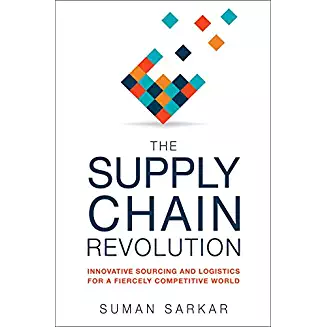
The smartest leaders see supply chain and sourcing for what they can be: hidden tools for outperforming the competition. Steve Jobs, upon returning to Apple in 1997, focused on transforming the supply chain. He hired Tim Cook, and the company sped up the development of new products, getting them into consumers’ hands faster. The rest is history.
Across a range of industries, once-leading companies are in trouble. While competitors were shuttering stores, Zara’s highly responsive supply chain made it the most valued company in the retail space and its founder, the richest man in Europe. The success of TJX, Amazon, Starbucks, and Airbus is fueled by supply chain and sourcing. Showcasing real solutions, The Supply Chain Revolution aims to educate leaders to improve customer satisfaction and increase revenue.
2. The Forklifts Have Nothing To Do! Lessons in Supply Chain Leadership
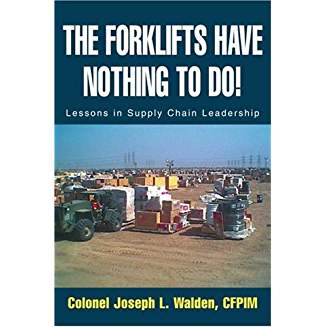
The Forklifts Have Nothing To Do! by Colonel Joe Walden provides practical methods for improving supply chain operations. Walden has spent more than 25 years leading supply chain operations and believes that improving your supply chain will improve your bottom line, regardless of your industry.
His recommendations draw on examples in civilian industry and military operations, including his recent experiences in Operation Iraqi Freedom. Supply chain operations in the military are very similar to supply chain operations in commercial industry. Both have the ability to improve operations for the customer.
3. Managing Supply Chain Operations
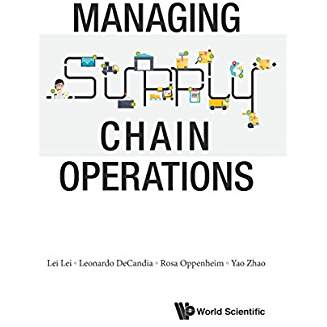
Managing Supply Chain Operations by Lei Lei, Leonardo DeCandia, Rosa Oppenheim, and Yao Zhao shows leaders the key drivers of supply chain performance. These include demand forecasting, sales and operations planning, inventory control, capacity analysis, transportation models, supply chain integration, and project management and risk analysis.
The book is enhanced by real-life examples and case studies, as well as strategies from best practices and a focus on social and economic impact. The content reaches beyond traditional operations management and draws on the extensive experience of the authors conducting industry projects through the Rutgers Center for Supply Chain Management. The input of senior business executives has been an invaluable asset in presenting a balanced knowledge of both quantitative models and qualitative insights.
4. Avoiding a Supply Chain Apocalypse: The Best of Dr. Tom’s Advice
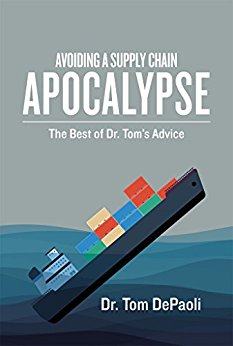
In his creative guide Avoiding a Supply Chain Apocalypse, Dr. Tom DePaoli offers practical strategies and tactics, learned and tested from his purchasing and supply chain career.
DePaoli recommends a multi-faceted, diverse approach to avoiding supply chain meltdowns. He challenges readers to survey his best writings and to select what fits their particular organizational cultures. There is no one-size-fits all in the supply chain. As the importance of supply chain management grows leaps and bounds, the supply chain professional must develop multiple options and proficient tactics to ensure the continuity of the supply chain.
5. Supply Chain Metrics that Matter
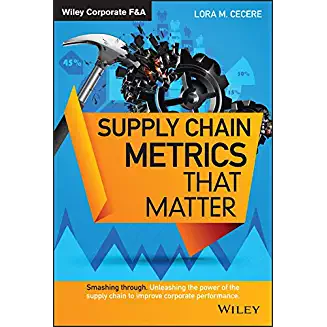
One cannot snap their fingers and deliver supply chain success. It happens over the course of many years and is measured in inches not miles.
In this book, Lora M. Cecere evaluates the progress of over a hundred companies over the period of 2006-2013. The effective supply chain makes a difference in winning a war, saving a patient, and driving commerce. But it also makes a difference in a community having clean air, potable water, and a higher standard of living. Mistakes are hard to overcome. Supply Chain Metrics that Matter tells this story. The book links corporate financials to supply chain maturity, and what metrics matter most.
What books for supply chain leaders do you recommend?
Related posts:


by Fronetics | May 18, 2017 | Blog, Leadership, Supply Chain
Add these books to your summer reading list to stay on top of industry trends and jump start your professional development.
“Education is the passport to the future, for tomorrow belongs to those who prepare for it today.” Malcolm X
Nikki Vazeos, regional sales manager at Veritiv, a leading North American distribution company, requires all of her sales reps to read one book a quarter that deals with professional development, sales techniques, or distribution trends and write a brief summary on how it applies to their day-to-day business. I always have found this kind of assignment to be beneficial on many different levels: professional growth, staying on top of industry trends, and of course, continuing education outside of the office.
If you’re a supply chain professional looking to build your summer reading list, this post is for you. Here are 5 highly recommended books that will jump start your professional reading.
5 books for supply chain professionals
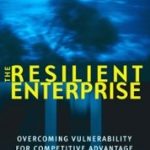 1) The Resilient Enterprise
1) The Resilient Enterprise
The Resilient Enterprise by Dr. Yossi Sheffi, Elisha Gray II Professor of Engineering Systems at MIT and Director of the MIT Center for Transportation and Logistics, has become one of the most influential supply chain resiliency books since its publication. Though published back in 2005, the book is still extremely relevant using numerous case studies and cautionary tales of some of the world’s largest companies. Dr. Sheffi explores high-impact/low-probability supply chain disruptions and the tools companies can use to reduce the vulnerability of their supply chains while fostering an overarching culture of resiliency.
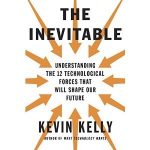 2) The Inevitable
2) The Inevitable
The Inevitable by Kevin Kelly guides its readers through the 12 technological imperatives that will shape the next 30 years and transform our lives. Kelly provides an optimistic road map for the future, showing how the coming changes in our lives — from virtual reality in the home to an on-demand economy to artificial intelligence embedded in everything we manufacture — can be understood as the result of a few long-term accelerating forces. Kelly both describes these trends — flowing, screening, accessing, sharing, filtering, remixing, tracking, and questioning — and demonstrates how they overlap and are codependent on one another. These larger forces will completely revolutionize the way we buy, work, learn, and communicate with each other. By understanding and embracing them, says Kelly, it will be easier for us to remain on top of the coming wave of changes and to arrange our day-to-day relationships with technology in ways that bring forth maximum benefits.
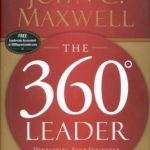 3) The 360° Leader
3) The 360° Leader
The 360° Leader by John C. Maxwell offers an in-depth look at the application of leadership principles, even when you’re not the boss. Maxwell asserts that you don’t have to be the “main” person to impact your organization. The book suggests tangible ways to influence peers and superiors and become a more valuable member of your team.
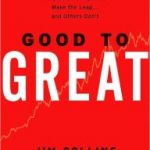 4) Good to Great
4) Good to Great
Built to Last, a book published by Jim Collins in 1994, looks at 18 companies that have triumphed over time, and how long-term sustained performance can be built into a company’s DNA over time. In Collins’ follow-up book, Good to Great, he concludes that it is possible, but it takes a lot of hard work and dedication.
Collins and his team of researchers began their quest by sorting through a list of 1,435 companies, looking for those that made substantial improvements in their performance over time. They finally settled on 11 — including Fannie Mae, Gillette, Walgreens, and Wells Fargo — and discovered common traits that challenged many of the conventional notions of corporate success. At the heart of those rare and truly great companies was a corporate culture that rigorously found and promoted disciplined people to think and act in a disciplined manner.
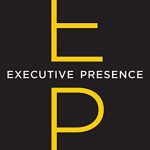 5) Executive Presence
5) Executive Presence
Executive Presence by Sylvia Ann Hewlett, a noted expert on workplace power and influence, shows you how to identify and embody the Executive Presence (EP) that you need to succeed. EP is a combination of qualities that true leaders exude, a presence that shows you’re in charge or deserve to be.
Articulating those qualities isn’t easy, however. Based on a nationwide survey of college graduates working across a range of sectors and occupations, Sylvia Hewlett and the Center for Talent Innovation discovered that EP is a dynamic, cohesive mix of appearance, communication, and gravitas. While these elements are not equal, to have true EP, you must know how to use all of them to your advantage.
Related posts:

by Fronetics | Apr 3, 2017 | Blog, Logistics, Strategy, Supply Chain, Talent
Hoping to draw more millennials to your talent pool? Implementing these three ideas might help win them over.
By the year 2020, millennials are estimated to make up a majority of the workforce. In addition, a 2014 study found that 46% of B2B buyers were millennials, and that number is on the rise. This seismic shift in workplace demographics calls for a new approach to attracting and retaining talent.
There are all kinds of stereotypes about this up-and-coming generation, many with a basis in truth, and just as many without. It’s crucial for your business to get to know this demographic group, both in terms of how they behave as consumers, and how they operate in the workplace. To that end, here are some ideas for attracting this talent pool to your company.
3 ideas for attracting millennial talent
1) Green technologies
Millennials are a generation saddled with all kinds of debt — from student loans to the ecological damage done by previous generations. Studies, not to mention voting behaviors, have shown that this generation is avidly interested in improving the planet’s future.
To win the hearts and minds of millennials, it’s time for your business to consider “going green.” Of course, green technologies can be prohibitively costly on a large scale — but many small changes can save you money in the long run. Not to mention, they will make your business a more attractive place to work for eco-minded millennials.
Consider making the switch from conventional to LED light bulbs, for example. If you have the resources, coupling smart thermostats in your facilities with higher-efficiency windows and doors is a great way to improve your carbon footprint, as well as your credentials among younger employees. Whatever your capabilities, making an effort to go green will go a long way toward making your business attractive to this generation.
2) Work-from-home options
Millennials are digital natives, accustomed to technology at their fingertips, with all the options that opens up to them. This often means the expectation of being able to work from a location of their choosing, whether it be home, a library, or a coffee shop. Millennials rank this kind of flexibility highly among factors that make companies appealing places to work.
Employers are increasingly answering the call, and even massive corporations like Wells Fargo and Aetna are finding ways to allow employees the option to work from home. These employers are finding that, often, what sounds great for employees also works to their advantage: A change of location can freshen thoughts, increase creativity, and lessen burnout that can slow down work for a team or entire company.
3) Opportunities to learn
Millennials are highly educated, and thirsty for knowledge — left unquenched, this thirst can lead them to job-hop frequently. At any given moment, 60% of millennial workers are open to pursuing a new employment opportunity. So how does your business combat this tendency and reduce turnover? One place to start is by offering continuing education to your workforce.
There are all kinds of ways to do this, and all kinds of benefits — including benefits to your bottom line. Making your employees more well-rounded means that they are more likely to be creative and flexible, able to respond to the needs of the constantly evolving supply chain industry.
Relating to millennials
Here’s the open secret: While each generation might have its quirks, millennials aren’t really all that different at the core than previous generations. They may express it in different ways, but they essentially want what workers have always wanted: interesting work, the opportunity to better themselves regularly, and to be treated with respect and dignity.
At the end of the day, you don’t need to be overly concerned about “relating” to millennials. According to one millennial writer, Sarah Landrum, “Millennials are in tune with current events, interested in getting involved with charity, and more interested in the world outside their heads than you might suspect.”
Related posts:

by Jennifer Hart Yim | Feb 27, 2017 | Blog, Supply Chain, Talent
Argentus Supply Chain Recruiting answers the question about what supply chain companies are looking for in new hires in terms of education.
This guest post comes to us from Argentus Supply Chain Recruiting, a boutique recruitment firm specializing in Supply Chain Management and Procurement.
This is the first installment of a new Argentus feature where we answer career questions. We’re starting this feature to help put our years of recruitment experience to good use, whether your questions are specific to our recruiting specialty of Procurement and Supply Chain or more general. You can find more questions and answers on our blog.
Drum-roll please for our first question:
Hello,
What value do you see in getting a Master’s Degree in Business/Supply Chain vs. some of the designations out there? (APICS, SCMA, etc.)?
Thanks, Vince C.
Thanks for the question, Vince. First of all, we aren’t experts in the curricula of both of these types of programs. Every university program is different, just as every professional designation is different. So we can’t speak to the specifics of various programs. However, we can speak to what companies are looking for in hiring, and how graduating from these programs builds your personal brand. We talk to lots of people in the field.
The short of it is that both an MBA and a Supply Chain designation such as APICS or SCMA can be a boon to your career, but your mileage may vary. It’s fairly common that a client looking to hire has designations as a requirement. It’s less common that they’ll ask for a particular designation (i.e. SCMA), although it’s certainly happened before. Companies are often looking to see that candidates are invested in their continued career development and education. A designation is a good way to establish that, and to pick up some valuable skills in the process.
It’s worth mentioning at this point that a designation is also often valuable for newcomers to North America who might have overseas Supply Chain Management experience, but haven’t yet secured that all-important first U.S./Canadian role in the field. A designation can be a great way to learn about local Supply Chain practices and increase your initial marketability while searching for that first role. While this option isn’t financially feasible for all newcomers, we’ve heard of candidates using it successfully in the past. A designation can provide networking opportunities, make you more marketable, and boost your income.
So is a designation the right move for your career?
One thing to keep in mind is that roles we get that “require” designations are typically at the sole contributor level — meaning below the “manager” level. Sole contributor roles can pay anywhere from 50k to 130k, so it’s not necessarily a roadblock, but it’s less common that leadership roles require designations. And while many designations offer strategic components to their curricula, we’ve had feedback from certain executives that a lot of the education offered is more transactional in nature — and that can be a limitation. For example, learning how to fill out a purchase order might make you a more immediately employable Procurement clerk at the junior end, but when looking for future leaders, executives want to hire people who have a holistic understanding of business strategy. Why are you filling out that purchase order? What’s the impact on the business? Should we be purchasing from someone else? Can we streamline our purchasing process? Should we be purchasing this at all?
The key to progressing into leadership is an understanding of strategy — so if that’s your goal, assess designations based on their strategic content.
Which brings us to MBAs — the coveted Master’s of Business Administration. It’s becoming more common for hiring managers to require Bachelor’s degrees, but it’s rare that they require an MBA. It’s also pretty new to have Supply Chain as an MBA specialization in the first place, and some people have used them to good effect to boost their careers.
The perception is that an MBA is going to be strategic. That they’re polished. That they have enhanced presentation ability. All of these are leadership qualities, and that’s why MBAs are seen as future leaders, even if the degree isn’t an absolute requirement to advance into business leadership — especially within Supply Chain.
However, there’s also the perception that an MBA isn’t going to be hands-on. From our perspective, an MBA isn’t going to work as a replacement for solid work experience. There’s a reason why people often work for 5-10 years in the field before pursuing an MBA: it’s going to augment your leadership potential, but it’s not going to give you leadership potential if you don’t have a variety of experience beforehand.
MBA programs encourage their students to think ambitiously, but it’s important not to let an MBA “go to your head.” We sometimes hear from recent MBA grads who expect to earn 150k+ on the merits of their degree rather than their experience, and they often find themselves in a 70k job a few years after graduating. If you’re prepared for this possibility, an MBA can be valuable, and it can help make you more marketable as a business leader.
So if you’re looking to slot into a Sole Contributor role, a designation might get you there faster. But if you’re looking to eventually climb into a Director, VP or CPO or CSCO role, an MBA might help you more. But don’t expect immediate dividends.
Again, we hope our advice is helpful! And every case is different, so take it with a grain of salt.
Oh, and send us more questions by visiting our blog and filling out a brief form. It can be Procurement and Supply Chain-specific, or it can be about any career topic.
Related posts:















